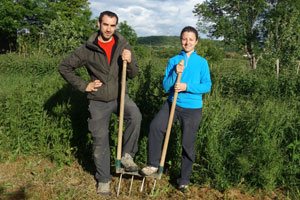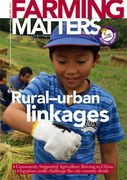‘New peasants’ – youth deciding to become farmers and choosing agroecological production methods – are a crucial response to the trend of rural outmigration. Sidney Ortun Flament and Bruno Macias see knowledge sharing and exchange as a means to support this movement.

In interviews, new peasants in France told us they find fulfillment in farming. But they also emphasised that farming is a risky business, and it takes several years to build a secure livelihood from it. New peasants have little prior agricultural knowledge, and certainly no ‘family land’ to inherit. They often have to learn how to farm without the support of their rural neighbours who consider them ‘outsiders’. Lack of land due to high prices and land grabbing, combined with difficulties in entering markets, make it very difficult to establish a new farm. Financial tools and credit are often unsuited to the small scale, multifunctional types of farms they want to develop. And where appropriate programmes do exist, many new peasants said that they had never heard of them.
Farmers remain a category of people with a negative social image. But this is a huge paradox as they master many skills – they connect with rural and urban people alike, find market opportunities, manage a complicated business, and, importantly, they excel in physically challenging agricultural techniques. And not being educated in family farming traditions, new peasants often turn out to be very innovative. When they work alongside existing farmers, they become a driving force for change based on sustainable, agroecological production.
New peasants are a crucial response to the issue of succession. Many retiring farmers do not have a son or daughter who wants to take over the business, while at the same time, many young people are looking for land to start a new farm. More support is needed to bring the two together.
We founded the Neo-Agri association to facilitate such crucial knowledge sharing and networking among new peasants and between them and established farmers. To support this movement further and revitalise rural areas we believe additional government interventions are needed.
Sidney Ortun Flament and Bruno Macias
Sidney Ortun Flament and Bruno Macias are part of the Neo-Agri association, which supports new peasants and established farmers working with agroecological approaches.
Email: contact@neo-agri.org

